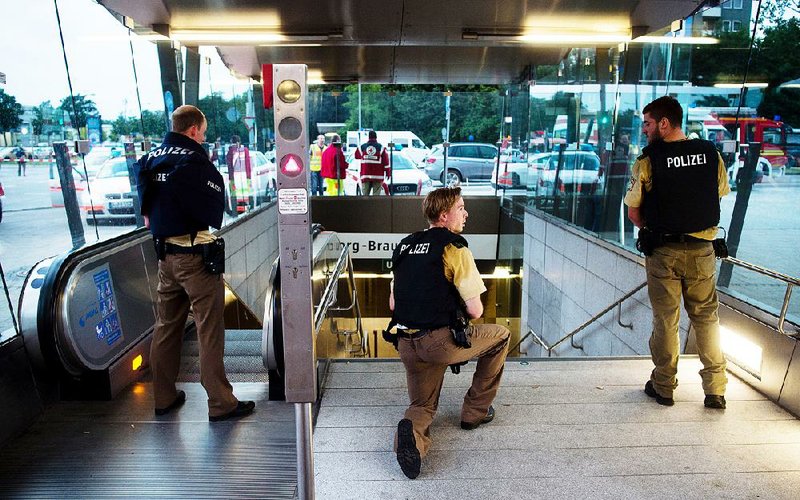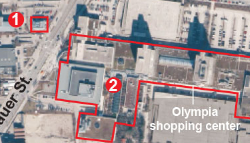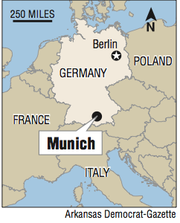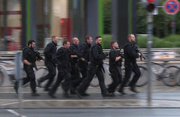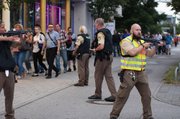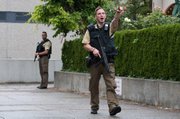MUNICH -- An 18-year-old German-Iranian man opened fire in a crowded Munich shopping mall and a nearby McDonald's Friday night, killing nine people and wounding 16 others before killing himself, the chief of police in the Bavarian state capital said this morning.
Police gave a "cautious all clear" more than seven hours after the attack began and brought much of the city to a standstill as all public transit systems were shut down during a manhunt. Police said a body found near the scene was that of the shooter and he appeared to have acted alone.
Munich police chief Hubertus Andrae said at a news conference that the gunman was a dual citizen from Munich and his motive was still "fully unclear."
Andrae said a body was found about 2½ hours after the attack and was determined to be the shooter on the basis of witness statements and closed-circuit television footage of the attack. The shooter was not previously known to police and there was no evidence of any links to terrorist organizations, Andrae said.
Witnesses had reported seeing three men with firearms near the Olympia mall, one of the city's largest shopping centers, but Andrae said two other people who fled the area quickly were investigated but had "nothing to do with the incident."
The police chief said the nine fatalities included young people and that children were among the 16 wounded, three of whom were in critical condition.
The manhunt had shut down traffic and public transportation across Munich, Germany's third-most-populous city and the capital of the state of Bavaria.
Police officers from Munich and from elsewhere in Bavaria flooded the city. An elite counterterrorism unit of the federal police also has been deployed to Munich, officials said.
While police called the mall shooting an act of terrorism, they said they had "no indication" it involved Islamic extremism and at least one witness, Luan Zequiri, told German broadcaster n-tv that he heard a shooter shout an anti-foreigner slur.
Zequiri said he was in the mall when the shooting started Friday. He said he heard the attacker yell the slur and "there was a really loud scream."
He said he saw only one attacker, who was wearing jackboots and a backpack.
"I looked in his direction and he shot two people on the stairs," Zequiri said. Zequiri said he hid in a shop, then ran outside when the coast was clear and saw the dead and wounded on the ground.
Police issued an appeal to the public not to post images or photographs of the attack, of the victims, or of police operations, warning, "Don't help the perpetrators!"
Police said they received a call around 5:50 p.m. Shots were reported from Hanauer Street, Ries Street and the Olympia Shopping Center, in the Moosach district, northwest of the city center.
A video distributed online showed a man dressed in black opening fire near a McDonald's restaurant next to the shopping mall.
Shooting victims began arriving Friday evening at Klinikum der Ludwig-Maximilians-Universitat Munchen, a university hospital, according to a spokesman there. The spokesman, Philipp Kressirer, said he did not yet have information about the conditions of the patients or how many were there. The hospital was one of several receiving and treating victims, he said.
Horst Seehofer, the premier of Bavaria, and Joachim Herrmann, the state's interior minister, convened a crisis meeting at the State Chancellery in Munich.
Germany's Interior Ministry said Munich police had set up a hotline for concerned citizens. Residents of Munich opened their doors to people seeking shelter using the Twitter hashtag #opendoor.
German Chancellor Angela Merkel was briefed regularly on the attack, said her chief of staff, Peter Altmaier.
"All that we know and can say right now is that it was a cruel and inhumane attack," he said on German public channel ARD. "We can't rule out that there are terrorist links. We can't confirm them, but we are investigating along those lines, too."
Altmaier noted that Friday was the fifth anniversary of the massacre in Oslo, Norway, by a far-right extremist that killed 77 people, 69 of them at a youth summer camp.
"You can only have absolute security in an absolute surveillance state, and nobody wants that, it would be the opposite of our free western European way of life," he said. "But, and this became clear again today, we can't talk down this danger. It's a danger that many countries are exposed, especially in the West, and that's why it's important to give our security agencies the instruments they need."
In Washington, President Barack Obama expressed support for Germany. "We don't yet know exactly what's happening there, but obviously our hearts go out to those who may have been injured," he said from the Eisenhower Executive Office Building. "It's still an active situation, and Germany is one of our closest allies, and so we are going to pledge all of the support that they may need in dealing with these circumstances."
Obama was briefed on the situation by Lisa Monaco, his assistant for homeland security and counterterrorism.
The State Department advised Americans in Munich not to attempt to travel to the consulate there. "Residents have been warned not to leave their homes," the advisory warned. "For your own safety, avoid squares and streets: perpetrators are on the run. Train and bus transport suspended. Turn radio and TV on. Munich's mainline railway station is closed, and mass transit remains halted."
The German foreign minister, Frank-Walter Steinmeier, said Friday night: "We are following the news from Munich with horror. What is behind this hideous act is not completely clear, we still have conflicting leads. But already this much is clear, we will have to mourn for many fatalities and injured."
gunshots, sirens
Television images showed armed police officers atop the shopping mall, trying to get the situation under control. On Twitter and on television, witnesses reported hearing sirens and police helicopters.
Bayerischer Rundfunk, the public broadcaster in Bavaria, reported that a witness had seen a gunman opening fire at the restaurant and then descending into the subway station under the mall.
Miriam Arlt, who was in the area, said in an email interview that she was near the McDonald's when the shooting occurred.
"I only saw fleeing people and now see police and a helicopter," she said.
Her roommate -- who asked to be identified only as Hendrik A. because he felt traumatized and fearful by what he had witnessed -- said in a phone interview that he had been riding his bike toward the restaurant when he came upon the site of the attack.
"I was over at the shopping center waiting for the light to get to McDonald's," he said. "I didn't even realize the chaos or the panic that was around me. I came to a stoplight and then I first realized that things were not normal. There were three bodies lying on the ground. And my first thought was 'OK, they're just lying on the ground, nothing really happened.' Two of them didn't move, one did."
Then, he heard gunfire ring out behind him -- "five to eight shots," he estimated -- coming from inside the shopping center. People started to run, he said. "It was not insane panic like you would imagine, a stampede or anything, but people were a little uneasy."
Police warned people to stay in their homes and to get off the streets; the mall took several hours to evacuate. A square in central Munich, the Karlsplatz, also known as the Stachus, was evacuated after reports of gunfire, which appeared to be a false alarm.
Train traffic to the main station in Munich was rerouted, according to a spokesman for Deutsche Bahn, the national railroad. Some suburban trains were continuing to operate, but were stopping before they reached the main station, said the spokesman, who asked not to be identified in accordance with company policy.
Passengers who landed Friday evening at Munich Airport found themselves stranded on the curb outside. The taxi line stretched at least 40 people deep, and airport officials said the highways leading into the city had either been closed or subjected to tight police checkpoints.
Manfred Reiter, a 47-year-old taxi driver, said he had received a call from his company's dispatcher telling him to avoid picking up customers from the street because the attackers were on the run and might try to flag a cab. "He said, 'Manfred please go home, it's too dangerous,'" Reiter said.
Police and security forces in Germany already had been on alert after a 17-year-old wielding an ax attacked passengers on a train Monday in Bavaria and then a woman walking her dog, before he was shot dead by police. The teenager has been identified by authorities as an Afghan who arrived in the country as a refugee last year, and who had been placed with a foster family. The attack injured four visitors from Hong Kong -- a couple, their daughter, and her boyfriend -- and the woman with the dog.
Gun attacks in Germany are uncommon. Firearm ownership is widespread but they are strictly regulated, with purchasers first having to take training courses to be granted a permit to own a weapon. Many types of firearms are banned.
Information for this article was contributed by Rukmini Callimachi, Melissa Eddy, Gregor Aisch, Victor Homola, Franziska Reymann, Jack Ewing, Sewell Chan, Christopher D. Shea and Ainara Tiefenthaler of The New York Times and by Michael Faulhaber, Frank Jordans, David Rising, Ferdinand Ostrop, and Jennifer Farrar of The Associated Press
A Section on 07/23/2016
